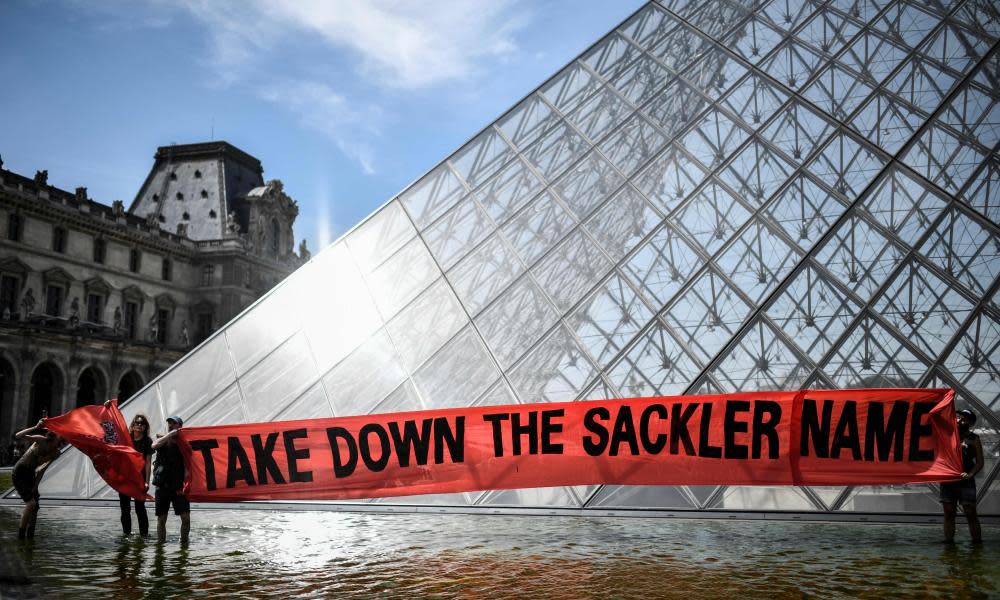Louvre removes Sackler name from museum wing amid protests

The Louvre museum in Paris has removed the name of the art philanthropist family Sackler from a major wing devoted to eastern antiquities.
The Sackler name came down this month after a protest by the US art photographer and activist Nan Goldin, who said it should be removed from gallery walls because some members of the multibillionaire family had benefited from the business of addictive painkillers.
The Louvre said the reason the name had come down was that the legal period of donors’ name rights was over.
After targeting other US and UK art institutions, Goldin demonstrated outside the Louvre demanding it rename the Sackler wing of eastern antiquities because one branch of the family is accused of profiting from the US opioid crisis, being the owners of the American pharmaceutical company that produces the highly addictive prescription painkiller OxyContin.
Goldin, along with Paris-based activists affiliated with her campaign group, Pain (Prescription Addiction Intervention Now), waded into the fountains beneath the Louvre’s pyramid with more than a dozen activists carrying red banners reading “take down the Sackler name”.
The group said the Louvre – the world’s most visited museum – should have been the first major museum to remove the name from its galleries.
At the time of the protest on 1 July, the Sackler name was still on the museum walls as well as its website. The Louvre’s Sackler wing was made up of 12 rooms of near eastern antiquities, including key pieces from the museum’s Persian collection.
On Wednesday, the Louvre confirmed in a written statement that the Sackler name had come down from the wing because the legal time-period of name-rights had ended.
Related: Hats off to Nan Goldin for calling out UK arts institutions on the Sacklers | Rhiannon Lucy Cosslett
The statement said: “The Theresa and Mortimer Sackler foundation supported the refurbishment of rooms of Persian and Levantine art in the period 1996 to 1997. Since then, there has been no other donation from the Sackler family. On 10 October 2003, the museum board decided to limit the duration period of named rooms to 20 years. This donation is more than 20 years old, the name-period is therefore legally closed and these rooms no longer carry the Sackler name.”
The museum did not comment when asked if the name was removed in reaction to protests over the opioid crisis.
On Tuesday, the museum’s president, Jean-Luc Martinez, was asked by RTL, a French radio station, whether he would take the rooms’ names down after Goldin’s protest. He said there was no question over removing the names from these rooms “because these rooms no longer carry the Sackler name”.
Goldin said: “I think this shows that direct action works. It’s important that this name be scrubbed from institutions and museums.”
She added: “Museums belong to the public and the artists, not to donors. They are supposed to be places where people can be educated and experience a higher form of education through art, not a place where they’re coming into contact with dirty money.”
Goldin pointed out that donations are essential to the functioning of museums. “But they have to be ethical. Apart from the public relations spinning [by the Louvre] the substance of what has happened is very important.”
During the protest on 1 July, Goldin, who currently has work on show at a modern art exhibition at the Palace of Versailles, wore her medal, the Chevalier des Arts et des Lettres, an honorary award from the French state for her art.
“It’s important for other activist groups to see that direct action can move mountains. The opioid crisis is coming to other countries and it’s important that people become aware that the Sackler name is synonymous with the opioid crisis. It would not have been a national public health crisis in the US without this family’s companies, including Purdue Pharma and others, hard-selling the most addictive prescription painkillers in history.”
Goldin added: “Other institutions in the UK and America who have refused Sackler donations have to take the next step and scrub the name from their walls. For others, it’s irresponsible and unethical at this point for them to still be willing to take Sackler donations.”
Goldin said her campaign group was not against opioids per se, as they can be an effective treatment, but “we are against opioid profiteering”.
The artist began her campaign against the Sacklers after she became addicted to powerful prescription painkillers. She has since demanded that arts institutions in the US and Britain refuse further Sackler donations and argued that the family should instead pay for treatment and rehabilitation for opioid addicts.
Representatives of the Sackler family have been contacted for comment.

